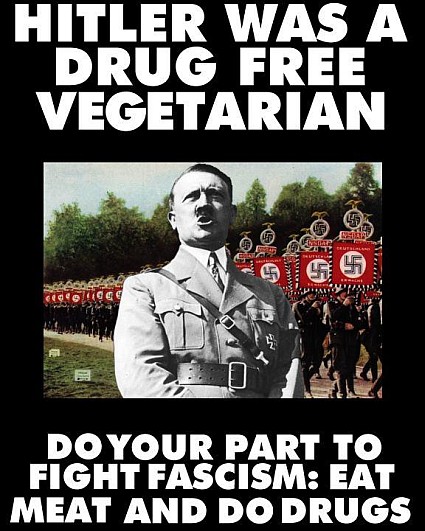
Anyone who hates dogs and kids can't be all bad
W.C. Fields
After 1945 Hitler was accused of every cruelty, but it was not in his nature to be cruel. He loved children. It was an entirely natural thing for him to stop his car and share his food with young cyclists along the road. Once he gave his raincoat to a derelict plodding in the rain. At midnight he would interrupt his work and prepare the food for his dog Blondi.....He could not bear to eat meat, because it meant the death of a living creature. He refused to have so much as a rabbit or a trout sacrificed to provide his food. He would allow only eggs on his table, because egg-laying meant that the hen had been spared rather than killed.
- General Leon Degrelle
Adolf Hitler
John Toland
Here is a monumental, vastly revealing biography of Adolf Hitler - filled with brilliant, original insights into the familiar aspects of Hitler's life, and offering a wealth of new material only recently discovered and never before published.
These are just a few of the startling details you will encounter within the pages of John Toland's masterful, definitive work:
• Hitler was never a paperhanger or a house painter. But he was once a choirboy, who loved to read Westerns and play cowboys and Indians...
• He wrote several plays and the libretto for an opera. St. Joan was one of his favorite dramatic works, and he knew many of Wagner's operas by heart...
• Hitler was plagued by a paranoid fear of cancer and by a genuine heart condition. He was also a strict vegetarian...
• He could type, drive a car (barely), play the piano (somewhat), used an elastic exerciser to stay in shape, and, like Napoleon, had a photographic memory...
• Hitler was the first head of state to promote planning modern urban planning and anti-pollution devices in cities...
• At least four women attempted suicide over Hitler, and at least three succeeded...
• The "Jewish question" was a long time obsession which directly or indirectly influenced almost all of his political and military strategies...
• Hitler was the central architect of the Final Solution, and some of its methods were inspired by the U.S Government subjugation of the American Indian...
• The Nazi laws defining "Jewishness" were carefully drawn to exclude both Jesus Christ and Adolf Hitler, who feared that one of his grandparents might have been a Jew...
Although much has been written about Adolf Hitler, he remains a creature of legend, myth, and misconception. . . .
Only in recent years have those who knew Hitler personally been willing or able to talk freely about him. John Toland has based this monumental biography on extensive research, involving a number of previously unknown or unavailable sources, and including over one hundred and fifty taped interviews with people directly involved in Hitler's private and public life. The result is a portrait of Hitler - as man, politician, and military leader - more complex and comprehensive than any ever before published.
With a masterful command of history, Mr. Toland has revealed Hitler within the context of the time that made him. The figure that emerges from these pages is in many ways more frightening than the traditional demonic caricature - for Toland has given the demon a human face. There are startling revelations in this book - details of Hitler's personal life never before known, and fascinating new perspectives on a number of well-known events. Many falsehoods are exposed and distortions set right.
But more remarkably, John Toland has given shape and meaning to the vast wealth of detail assembled here. It is an extraordinary, brilliant work of biography, of military, social, and political history.
Countless books, including five major biographies, have been devoted to the subject of Adolf Hitler. Yet, despite the mass of tantalizing detail uncovered over six decades, the man at the center of so much study and evil circumstance remains elusive. For some he was evil personified, a diabolical tyrant driven by a lust for power; for others he was a banal demagogue, an opportunist with talent for propaganda and speech-making but little more than an empty vessel embodying the disappointments of a defeated Germany. Though we know many facts about Hitler, no coherent picture of his character or personality emerges. Instead, we are left with a cardboard cutout of an evil dictator whom in the end no one can really explain. The author sees Hitler as a young man who would consciously transform himself into a self-proclaimed messiah, a savior who would be called by providence to make new Germans capable of defending themselves against a French-imposed punitive peace. On another level, Stolfi reinterprets Hitler as the creator of a quasi-mystical political movement based on his revelation that the Germans were under attack by a Jewish-inspired Marxian Socialism of global dimensions. As such Hitler would set Germany on a course intended to achieve historical permanence for the state and personal immortality for its providentially inspired leader. Finally, Stolfi ranks Hitler's successes from 1919 through 1941 as achievements so astonishing that he must be characterized, along with Alexander the Great, Julius Caesar, and Napoleon, as one of Hegel's impossibly rare world historical personalities. Without in any way glorifying its subject, this unique revision of Hitler biography brings us closer to understanding a pivotal personality in the history of mankind. Editorial Reviews "...what I find attractive in Stolfi is the structure of his argument...I confess that I read Stolfi's biography with rising excitement. Suddenly Hitler was stepping forward commanding the stage—and without the intervening moral disapproval of the biographer. ...[Stolfi] has to sacrifice many other worthy points of view, but in doing so, I believe, he has made a valuable contribution not only to studies of Hitler, but to the study of biography itself." -- Bibliobuffet About the Author |


